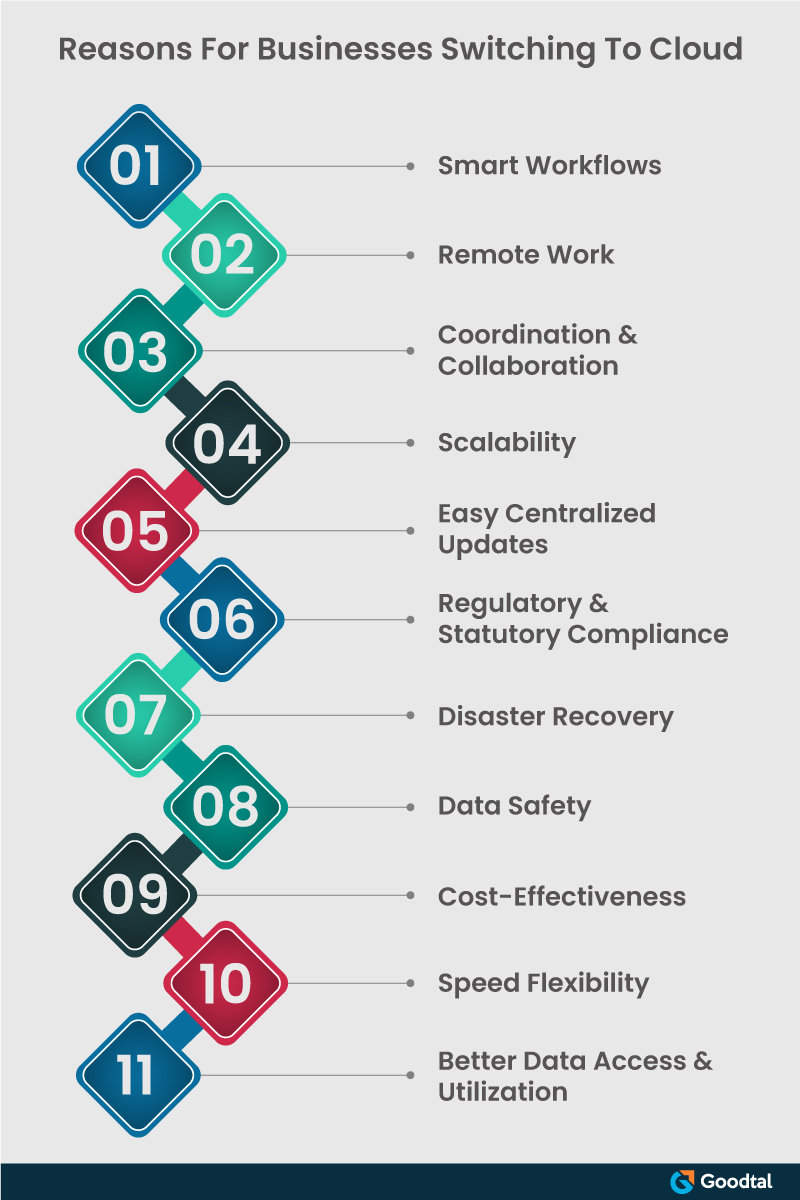
To compete in the customer-centric market, businesses have always been proactive in adopting cutting-edge technology that improves their systems and operations. Cloud is one such trending technology that has changed the world for the better.
Most working people use Cloud technology daily, though some of them haven’t even heard the term “Cloud.” Such is the span and popularity of this technology. And, after the Covid-19 pandemic, the percentage of businesses switching to Cloud has increased manifold. The worldwide public cloud computing market continues to grow and is expected to reach an estimated 482 billion U.S. dollars in 2022.
Why Are Businesses Increasingly Adopting Cloud?
As indicated by the above statistics, businesses worldwide are switching to Cloud. Here are the reasons for this trend!

Setup Smart Workflows
Cloud-based intelligent workflow can connect systems or streamline communication channels for businesses. It can integrate Artificial Intelligence and Machine Learning to achieve interactive real-time systems that adapt to users’ needs.
Intelligent Cloud Workflow Management and Scheduling can also make periodic business processes smarter and more efficient. Once configured accordingly, it doesn’t require manual intervention. Moreover, automated workflows are easier to maintain consistently. Such systems have the ability to upgrade with changing business requirements over time.
Work Remotely
Working remotely has been one of the most significant areas where the world realized the importance of Cloud technology during the Covid-19 pandemic. The pandemic forced millions of people worldwide to switch to work-from-home mode, some not even getting 48 hours to prepare for it. Had there not been Cloud systems, it wouldn’t have been possible for thousands of businesses worldwide to continue working without interruptions and without putting their workforce at risk.
There were many hassles adapting to the changed work mode and lifestyle. However, due to Cloud technology, the work continued uninterrupted only to make the world realize that this work mode could be the new norm and the future of workplaces.
Better Team Coordination & Collaboration
Communication done over Cloud is more streamlined. Cloud technology is thus a game-changer for the collaboration and communication activities of the business. Before Cloud technology came into existence, people would not have imagined working on the same document simultaneously from different or remote locations with so much ease and in real-time. With Cloud-based software, multiple people can view and edit the documents simultaneously.
Businesses can allow permission to allow many users working on a project to change the same document. Audio and video communication has also become faster and easier, besides being cost-effective through the Cloud systems. Be it internal communication amongst the teams or with the customers, Cloud has not just made it faster but even better monitored and regulated for the successful functioning of businesses.
Scalability
Once a cloud system is set, it is convenient to upscale or downscale as and when needed without affecting the system's performance during such events. All the system modules are connected to the centralized Cloud and can start functioning when added to the network. Also, if any modules fail, these can be isolated to resolve the issues without affecting the system or network.
For a business operating through a Cloud, managing IT hardware and software problems is thus not an issue; they can simply switch the user to another machine that is a part of the same Cloud, and the work goes on uninterrupted.
Easy Centralized Updates
Cloud systems enable centralized controls and checks irrespective of how wide the span of the network is. Thus, Cloud systems allow easy management of various support and maintenance activities such as updates, monitoring, backups, restoration, user authentication, access controls, etc. The administrators can monitor the system's functioning and control the Cloud-based system from any location.
As the Cloud systems give easy remote access, crashes or downtimes are not just detected easily, but the system can also be restored quickly.
Regulatory and Statutory Compliance
Cloud systems empower administrators to set up and offer real-time and quick regulatory and compliance policies through centralized management.
Compliance procedures can be set up, managed, and even automated easily through the Cloud without worrying about compliance through different modules or terminals individually. This helps avoid missing out or sacrificing compliance on any part of the network merely due to negligence.
Disaster Recovery
Cloud systems allow safe and robust storage through remote servers that are physically located at specialized centers which are capable of maintaining them. Cloud systems generally maintain multiple copies of data and backups, so there is hardly any possibility of losing any data. It ensures regular data backups that can be used for restoration in case any disaster causes data loss. Restoring from backups is so quick with the cloud that the end-user would not even come to know that there was a data loss.
Data Safety
Cloud development is a boon for implementing centralized security for data and the system. Thus it helps prevent the loss of valuable business data.
All settings, authentication, authorization, and access controls can be managed centrally and remotely by the administrator without worrying about the scale and span of the system. It allows better management and control of business data without even having to move the data from one location to another physically.
Cost Savings
All services come with costs. In large-scale systems and over the longer run, Cloud systems are extremely economical compared to their counterparts.
Without Cloud, even very costly software had to be installed on individual machines. So it was very difficult to share licenses between two different people working on the same task, one after the other. Cloud technology offers flexibility in various software usage models that have empowered small businesses to manage their software licenses better. Cloud thus allows offering pay-per-use flexibility and subscription models for software and services.
Due to Cloud, businesses can allow access to resources, software, data, and much more to employees and customers even remotely, thus saving a lot on resource costs and logistics.
Speed Flexibility
High-speed internet connectivity is almost a norm now worldwide, and no more is it a limiting factor for Cloud systems. Cloud systems are easy to maintain and allow good speeds in real-time access. Also, Cloud-based systems are not dependent on an individual terminal’s configuration or speed; they will perform if the Cloud server configuration can support the system speed requirements.
Real-time data storage, retrieval, and communication were never so fast, easy, and hassle-free without Cloud systems.
Better Data Access and Utilization
Cloud-based systems are flexible for space requirements and allow speedy storage and access to data. Businesses that use Cloud have the opportunity of collecting and storing large volumes of data without worrying about space, data security, access speeds, and backups. This has empowered the domain of Big Data Analytics like never before. Various technologies help filter and segregate this data to derive useful information.
Integrating ML and AI in Cloud systems further helps generate valuable insights from this data for decision making. Business Intelligence has thus seen amazing breakthroughs due to Cloud systems.
Apprehensions That Businesses Face Before Switching to Cloud
Challenges are associated with every technology and its integration with your existing processes. Some businesses are apprehensive about adopting Cloud technology as they are not ready for the challenges expected from implementing it.
Cloud technology, on one hand, helps businesses manage regulatory compliance with ease, but on the other, it increases some regulatory compliance requirements. Businesses will have to take care of GDPR compliance while collecting and storing data over the Cloud. Irrespective of the physical location of the server, businesses operating over the Cloud are obligated to comply with legal and statutory requirements for all the countries the system is serving.
Also, Cloud allows a wide span and multiple access points, some of which could be across different locations globally. Also, the data centers could be located completely separate from all the access locations. So, all the networks, as well as access sites, are susceptible to data and security breaches if proper measures are not put throughout the system.
However, it would not be right to assume that such problems are only with and due to Cloud. For businesses operating globally, protection against security breaches is always a challenge due to the wide span and multiple access points sharing data or communicating with each other digitally.
Nevertheless, modern Cloud systems are developed keeping in mind all the issues that Cloud systems might encounter and can ensure a high level of compliance, quality, and security.
Wrapping Up!
Cloud technology is an indispensable part of modern businesses. As detailed here, it makes the processes and services effective, efficient, cost-effective, and much more. This is the reason most businesses are switching over to Cloud.
Like any other successful system, the success of cloud systems is largely dependent on proper development and implementation. So, businesses that are still using old and conventional technologies should immediately look for full-stack AWS or Azure developers and adapt to the times.
